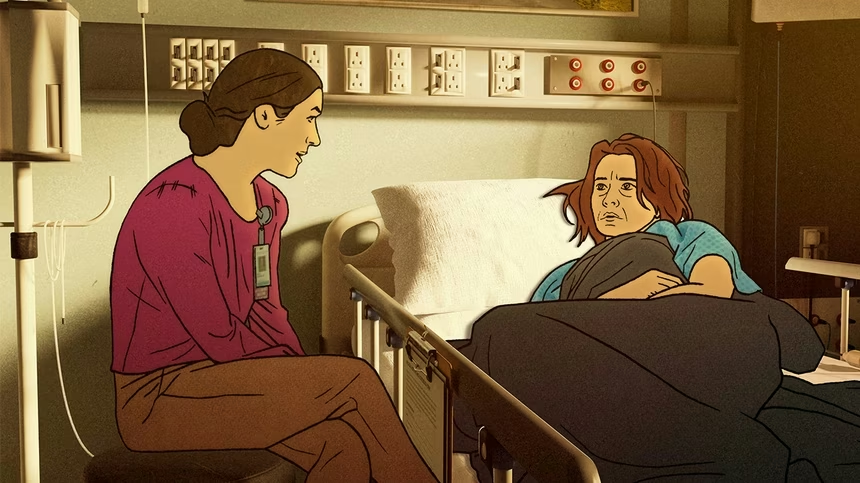
Has Journalism Always Been This Stressful?
Clip: Season 25 Episode 11 | 8m 52sVideo has Closed Captions
A mental health crisis has taken shape in our newsrooms.
As news evolved over the last 40 years from a single daily paper or nightly news show to something that's pushed 24/7, a mental health crisis has taken shape in our newsrooms as journalists race to cover traumatic events and get the most views.
Problems playing video? | Closed Captioning Feedback
Problems playing video? | Closed Captioning Feedback

Has Journalism Always Been This Stressful?
Clip: Season 25 Episode 11 | 8m 52sVideo has Closed Captions
As news evolved over the last 40 years from a single daily paper or nightly news show to something that's pushed 24/7, a mental health crisis has taken shape in our newsrooms as journalists race to cover traumatic events and get the most views.
Problems playing video? | Closed Captioning Feedback
How to Watch Independent Lens
Independent Lens is available to stream on pbs.org and the free PBS App, available on iPhone, Apple TV, Android TV, Android smartphones, Amazon Fire TV, Amazon Fire Tablet, Roku, Samsung Smart TV, and Vizio.

The Misunderstood Pain Behind Addiction
An interview with filmmaker Joanna Rudnick about making the animated short PBS documentary 'Brother' about her brother and his journey with addiction.Providing Support for PBS.org
Learn Moreabout PBS online sponsorship- Picture the last serious news story you viewed.
How did it make you feel?
Exhausted?
Anxious?
Overwhelmed?
Me too.
And we're not alone.
A 2020 survey found that 2/3 of Americans are worn out by the sheer number of news stories.
That doesn't even account for the amount that's bad news.
Another study showed that just three minutes of negative news in the morning makes you 27% more likely to have an "unhappy" day, compared to people who view positive news.
If consuming news can be bad for us, what about the journalists covering it?
It's not just one story for them but their life's work.
(gentle music) - I was based in the Middle East from 2008 to 2013.
I was covering the Arab Spring uprisings at that time.
It's huge intense protests where security forces would fire upon protestors, where protesters would later be put in jail, tortured, some of them killed.
You know, people you knew, people you were reporting on.
One of the hardest things to do is to remain this sort of calm, impartial vessel that we're supposed to be when it's a time of danger and pain for so many people.
- Has journalism always been this stressful?
Let's go back in time and see how the history of the press led us here, and whether there's hope on the horizon.
(keyboard clacking) To understand the stress on journalists, we need to recognize why they face so much pressure.
(explosion booms) Many reporters view their work as a calling and a public service, not just a job, holding values like objectivity and social responsibility above all others.
- There's a huge sense of duty and responsibility that comes with this job.
I feel it.
I know all of my colleagues feel it.
And with that, I think, does come this sense of obligation that you have to bear witness, you have to show up, you have to see some of the worst things in humanity to be able to report on them so the rest of the world may know.
- This feeling of responsibility can actually be traced to the founding of the United States.
The importance of journalism was enshrined in the U.S. Constitution's First Amendment, which includes freedom of the press.
But over the last 250 years, there have been different ideas about how freedom of the press should be interpreted.
This has resulted in journalists struggling to be respected and keep their autonomy.
The first big journalism battle happened way back in 1798 with the Alien and Sedition Acts.
So they established the constitution, and then immediately challenged it?
That's bold.
At the time, the Federalist Party was in charge, and they used the Sedition Act to prevent their rivals, the Democratic-Republican party, from printing anything critical of the government.
And it worked.
The only editors prosecuted under the law were from Democratic-Republican newspapers.
Was this constitutional?
We never got a chance to find out because the Federalists became majorly unpopular for suppressing dissent.
One critic was Thomas Jefferson, who happened to be Democratic-Republican.
He became president in the next election, and the Sedition Acts were allowed to expire.
But the threat to journalism returned several more times, prominently in 1917 with the Espionage Act.
This law cracked down on anyone who caused, quote, "injury" to the United States, and it resulted in prosecutions of anti-war journalists.
Some of these cases were challenged all the way to the Supreme Court, which originally sided with the government.
But future Courts slowly reversed these decisions, and over time, they did enshrine more protections for the press.
These cases helped establish certain standards for the field.
The notion of journalism as a societal good was cemented in 1947, in a publication produced by the Hutchins Commission.
This Commission set the expectation of journalism as having a social responsibility to the public.
But keeping this expectation in the forefront has not always been easy, especially as major technology changes have upended the news industry as a whole.
In 1991, thanks to a special phone line, CNN reported on the Gulf War live as it was unfolding.
- [Reporter] The skies over Baghdad have been illuminated.
- CNN's coverage of the Gulf War changed the news landscape forever.
As a result, news companies have to fill the air and your feeds with stories that will get views and clicks.
- That's the thing about the news, it just marches on.
You know, you don't get to pause.
You got...
There's always gonna be another show on the air that you've gotta fill, you know.
And you've got to show up and sound like a reasonable person who's gonna lead the listeners through what is difficult for them too.
(explosions booming) - Oh my god, yes!
- On top of these pressures, many journalists put their own mental health on the back burner to make sure they get the story right.
Reporters often arrive on the scene at the same time as first responders, or even before.
Being present in difficult, and often traumatic, moments can be vital for telling people's stories and getting information to the public.
But it can also be taxing.
Researchers have studied journalists' mental well-being in cases like war- and conflict-zones and more recently, experiences with everyday news events such as car accidents, fires, mass shootings, and natural disasters.
And it turns out, reporters are at high risk for a range of mental health issues, including PTSD, compassion fatigue, guilt, and general emotional distress.
Some studies even note that journalists develop alcohol use disorder and depressive symptoms at higher rates than the general population.
They can also experience indirect emotional pain from interacting with victims or loved ones who have lived through horrible tragedies.
- I apologize.
- And then there's a delayed emotional distress that hits them after the story is complete and they've had time to reflect on it.
[Amna] - Who am I to complain about something like having panic attacks, or being struck by anxiety because of these stories, or having nightmares because of these things?
But I realized, over time, we have to talk about it because if we don't and we don't process, we're not able to go back and continue to do the work that we need to do.
- But then you can't lose sight of the fact that you are also having feelings as you vicariously soak up that trauma.
Or maybe you go through dangerous and traumatic events yourself, losing colleagues at war, that kind of thing.
- Unlike firefighter, paramedic, and police training programs, only about 7% of journalism programs teach the mental tools needed to deal with traumatic encounters.
But as research on the mental health of journalists has taken off, so have efforts to help newsrooms and individuals balance social responsibility with their well-being.
- In the beginning it was, "You're on your own.
No complaining, you know, 'cause you got to be tough."
As the industry changed, as you saw it become slightly more inclusive, people who were covering these stories started kinda putting their hand up and saying, "Hang on, you know, this is tough.
We need some support."
- Some suggestions to alleviate stress include: regular screenings of journalists to find early signs of mental and emotional distress, training and education to help them develop coping strategies, and creating work cultures that are more open to disclosure and decreasing stigmas.
And part of that can come from just talking about the shared experiences they face in the field.
- I, for example, serve on NPR's peer support group.
There's a couple dozen of us who have had a little bit of training just to be a sort of a first call that our colleagues might make if they feel like you need to talk.
And I've used it myself.
- There's also an amazing resource.
It's called the Dart Center for Journalism and Trauma at Columbia University.
Originally, it was set up to teach journalists how to do trauma-informed reporting, which is incredibly, incredibly, incredibly important.
But they also talk to journalists about, you know, how to deal with their own trauma in dealing with these settings.
- I think people may see it as a weakness or vulnerability.
To me, it is just the essence of being human, that you need help sometimes, that we all need help sometimes.
And I think the fact that one out of every four people in America have some kind of mental health challenge or struggle speaks to just how shared an experience this is in our country.
- For a real, behind-the-scenes look at how reporters handle the pressures of big stories, check out the documentary "Breaking the News" on the PBS app.
It's about a newsroom trying to upend the model of male-dominated organizations to cover topics relevant to women and the LGBTQ+ community.
What about you?
How do you balance the stress of news with staying informed?
Tell us in the comments below, and thanks for watching.
♪♪
Video has Closed Captions
Clip: S25 Ep11 | 9m 3s | What are the challenges facing local journalists? (9m 3s)
How Did Opinions Get In Our News?
Video has Closed Captions
Clip: S25 Ep11 | 7m 44s | It's not always easy to spot the difference between facts and opinion. (7m 44s)
How Did This Women-Owned Newspaper Revolutionize Journalism?
Video has Closed Captions
Clip: S25 Ep11 | 7m 8s | How a women-led newsroom blazed a trail for women's rights. (7m 8s)
Video has Closed Captions
Preview: S25 Ep11 | 30s | Women and LGBTQ+ journalists launch news startup The 19th* to combat misinformation. (30s)
Providing Support for PBS.org
Learn Moreabout PBS online sponsorshipSupport for PBS provided by:




















